ACRC CONDUCTED AN INTEGRITY PERCEPTION SURVEY OF 1,925 STUDENTS AT 97 MIDDLE AND HIGH SCHOOLS TO UTILIZE THE RESULTS IN FORMULATING ANTI-CORRUPTION POLICIES TO IMPROVE PERCEPTIONS OF THE FUTURE GENERATION
The result of a survey of 1,925 middle- and high-school students in the country on their perceptions of acts of improper solicitations for benefits of a certain person against the principle found that 64.7% of the students said “absolutely unacceptable”.
In addition, the greatest proportion of the students responded that strict detection and punishment of unfair acts are necessary to improve an awareness of integrity.
Anti-Corruption and Civil Rights Commission (ACRC, Chairperson Jeon Hyun-Heui) surveyed 1,925 students in 97 middle and high schools in the country on their integrity perceptions, etc. in order to establish anti-corruption policies reflecting perceptions of the future generation. The survey was conducted by an opinion research company, Hyundai R&C, for ACRC, with a margin of error of plus or minus 2.62%p at a 95 percent level of confidence.
ACRC asked students questions regarding their perceptions of a general level of corruption and fairness in our society and a few representative types of corrupt acts, such as improper solicitations, privileges given or accepted due to personal connections, and the private use of confidential information acquired in the course of performing duties, and collected their opinions by giving them detailed examples of acts they can encounter during their school life.
First, as for questions asking their perceptions of the level of corruption and fairness in the society, 49.8% of the students responded the society is corrupt (61.1% in 2020) and 45.3% said unfair (56.7% in 2020), indicating that the perceptions of the youth have been greatly improved compared to 2020.
Second, with regard to a question asking perceptions of different types of corrupt acts, students who said acts of improper solicitations for benefits of a certain person against the principle are “absolutely unacceptable” took up the biggest proportion at 64.7%, followed by students who said “acceptable according to circumstances (19.9%) and those who said “I will do the same (4.2%)”.
Regarding an exemplary case 1 suggested in the survey where a student could not mark answers on his/her answer sheet due to lack of time and his/her father asked a teacher to whom he/she has been close to mark the answers on behalf of his/her child, students who said “I will tell my father never to do it” stood at 47.2%, the highest, followed by those who said “I would feel a little regretful but will not ask my father (36.4%)”, “I will ask my father to make solicitations since there is an evidence that I solved the questions and only could not finish marking (6.1%)”, and “I will visit a teacher together with my father with a gift, etc. (1.8%)”, indicating the highest proportion of students (83.6%) responded they “will not make improper solicitations (never do it + will not ask)” where detailed exemplary cases are suggested.
< Perceptions of Improper Solicitations / Examplary Cases>
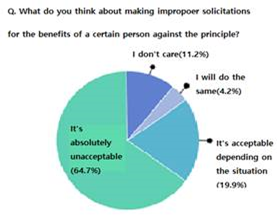
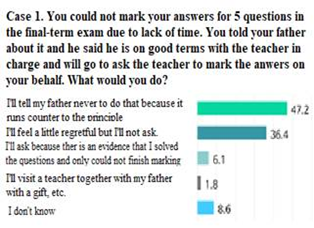
Regarding privileges being provided for some people due to regionalism, kinship and school relations, etc. 55.3% of the students surveyed answered “absolutely unacceptable”, 30.5% said “acceptable depending on the situation”, and 4.7% said “I will do the same.”
As for the case 2 where you noticed your close friend was late for class when you were checking students’ tardiness as a member of a student council, the highest rate of students surveyed responded “I
< Perceptions of Privileges Offered/Received Due to Personal Relations / Case >
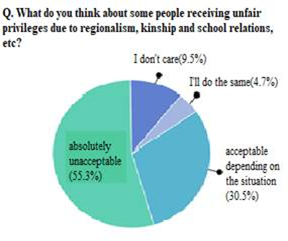
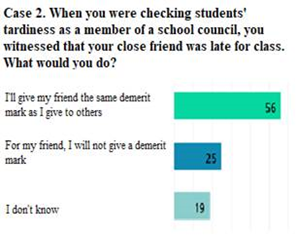
In respect of a question asking peceptions of the use of confidential information acquired during the performance of duties for private benefits, the students who said “absolutley unacceptable” stood at 50.6% while 31.4% and 6.9% said “acceptable depending on the situation” and “I will do the same,” respectively.
When students were suggested a case where they saw final-term test papers in teachers’ office as a person in charge of the class, students who answered they would not look at the paper took up the highest proportion of 43.8%, followed by those who said “I will tell a teacher that there is a risk of leakage of test papers (31.5%)”, “I will sneak a glance at exposed part of the papers (11.8%)”, “I will take a photo of test papers using my cellphone secretly (3.7%),” indicating that the proportion of
students who responded “I will not use duty-related confidential information for personal benefits
(I will not look + will tell a teacher)” was very high at 75.3%.
< Perceptions of Private Use of Duty-Related Confidential Information >
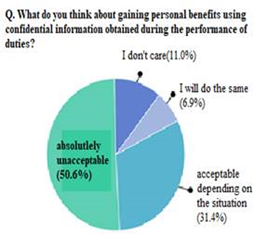
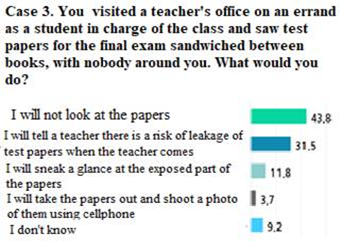
On the other hand, regarding what we need most to raise an awareness of integrity, the proportion of the youth who selected “strict detection and punishment of illegal acts (43.7%)” was the highest, followed by those who picked “taking an initiative and setting an example by adults (24.9%)” and “cultivation of a sense of community (17.5%)”.
Director General of the Anti-Corruption Bureau of the ACRC, Han Sam-Seok, said, “The ACRC will actively promote integrity and anti-corruption training, etc. for the youth, leaders of the future generation, to be able to feel the importance of integrity.”
